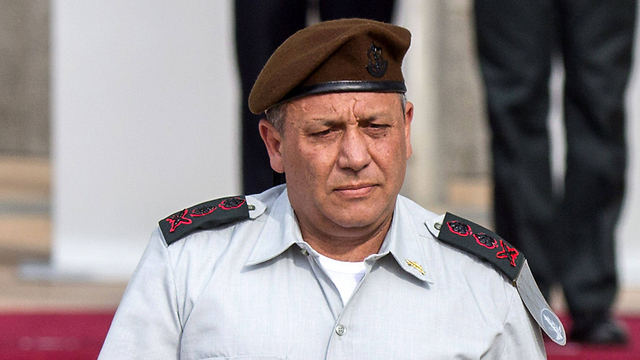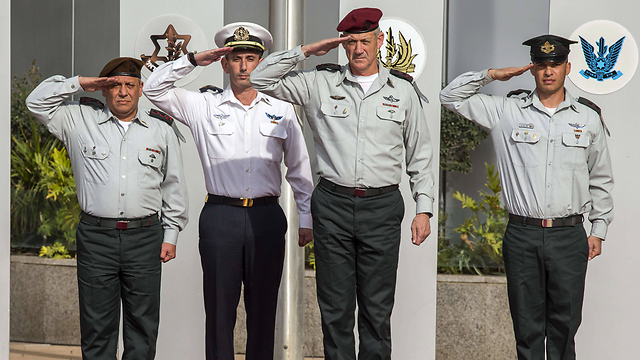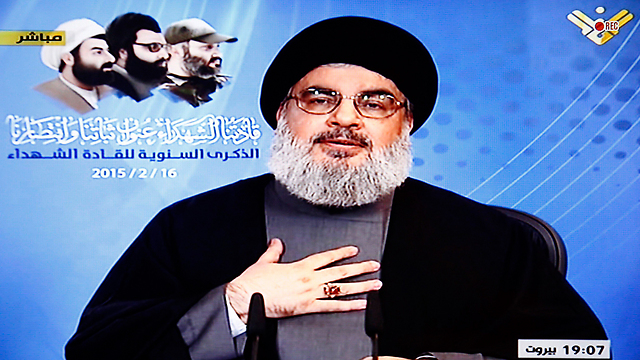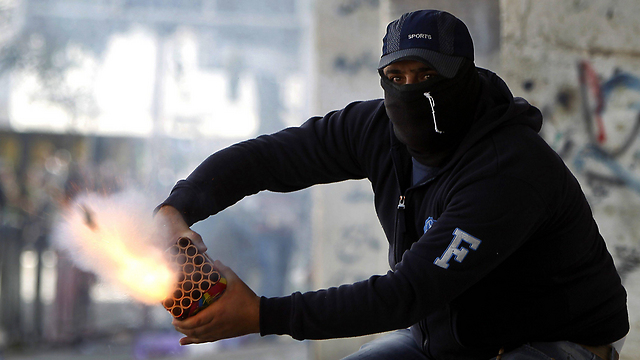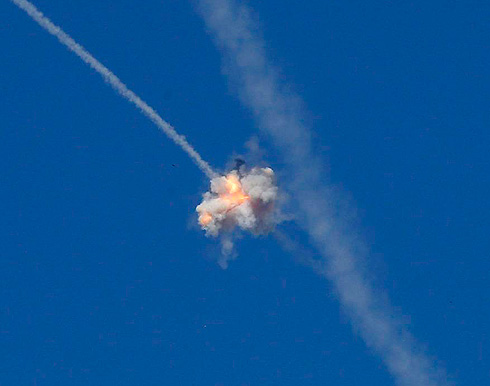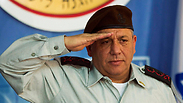
With north beginning to boil, Eisenkot is right man at right time
Analysis: The new IDF chief of staff will have to face a potential massive conflagration on the northern border, but he has the tools to deal with whatever is thrown at him.
As the Israel Defense Forces' 21st chief of staff, and the country's most influential professional military authority, Lt. Gen. Gadi Eisenkot, who stepped into the position Monday, will be operating in the seam zone between military thinking and action and the positions and decisions of the political echelon, particularly at critical junctures at which an error of judgment could exact a very high price in blood.
At present, with the Middle East in general, and Israel's neighbors in particular, becoming less predictable and increasingly fragmented, volatile and self-destructive by the day, the most important challenge facing the incoming chief of staff is to prevent a large-scale conflagration in the wake of an incident in the field that gets out of hand and escalates, albeit contrary to the wishes of the leaderships of the sides involved.
The chief of staff doesn't always intervene. However, when an incident has the potential to spark an escalation, he is the one who, after a very brief decision-making process, issues directives to the commanders in the field. And in doing so, the chief of staff essentially determines the height of the initial flames, and then advises the defense minister and cabinet on how to move forward. More precisely, he presents a number of alternatives and explicitly states his preference.
Related articles:
Eisenkot is one of only a handful of senior IDF officials who have military experience as a fighter, a commander and a senior General Staff officer. He has demonstrated composure and level-headedness during various large-scale conflagrations, such as the Second Lebanon War and Operation Protective Edge; and the fact that he served in the past as military secretary to former prime minister Ehud Barak also helps to make him ripe for the position of chief of staff.
His critics claim that as a general, Eisenkot is "not offensive" enough; but even his detractors can't deny his military mindset, which particularly befits the challenges of the current period. He is blessed with almost all it takes to function properly in situations that require quick decision-making, flexible thinking, composure and the will to win.
Until about a month or so ago, Military Intelligence and General Staff officials were of the opinion that the Palestinian arena (Judea and Samaria, the Gaza Strip, and the delegitimization campaign around the globe) would be the IDF and its chief of staff's primary concern and field of operation during the course of 2015. The prevailing assessment now, however, is that the northern arena is about to become the main source of potential for a large-scale conflagration.
Hezbollah, under the leadership of Hassan Nasrallah, and senior Iranian Revolutionary Guard officials responsible for the Syria-Lebanon arena have initiated this development. They are the ones who decided recently to turn the Golan Heights into an active conflict zone with Israel, and they have made extensive headway, too, in their preparations to realize their intentions.
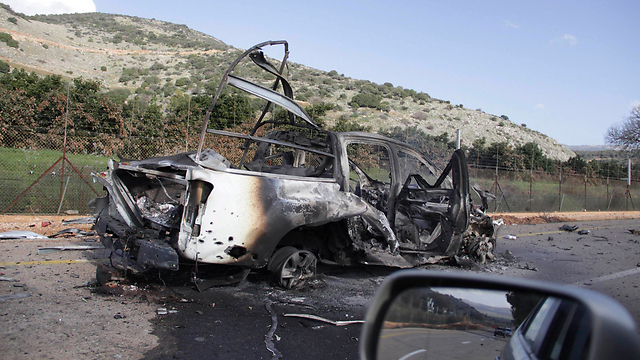
This strategic shift in behavior vis-à-vis Israel on the part of the radical axis of the Iranian leadership stems from two main reasons. The one: Hezbollah's involvement in the fighting in Syria is sparking harsh criticism of the organization in Lebanon. Some Shia officials are even claiming that Sunni groups Islamic State and Jabhat al-Nusra are operating against Lebanon because Hezbollah is fighting to preserve Bashar Assad's regime in Syria.
Hezbollah therefore needs renewed legitimacy to exist and operate as an independent army from Lebanon's sovereign territory. The legitimacy is "defending Lebanon and its sovereignty" against Israel; but Hezbollah fears that operating against Israel from Lebanon would lead to a deadly and destructive war in which Israel, too, would suffer, but Lebanon would be pushed back into the Stone Age.
Hezbollah and the Iranians have been unable thus far to stop the air strikes in Syrian territory on the convoys of "tie-breaking arms" that the foreign media attribute to Israel. Hezbollah can't respond to the attacks from Lebanese territory (for the abovementioned reasons), and it can't attack from Syria either because the organization does not want to admit to the international community that it is violating Syrian sovereignty. And another reason – Nasrallah doesn't want to embroil Assad in a large-scale Israeli response that would weaken him in his conflict with the Syrian rebels.
But things are changing of late. Hezbollah and the Iranians are not yet ready to take direct action against Israel from Lebanon, but they are certainly ready to open a new front against it on the Golan Heights. Nasrallah has even declared so in public, in a speech he delivered a few weeks ago.
The reason for the change is that the Iranians and Nasrallah have finally come to the conclusion – the seemingly correct one – that Israel has no desire to get embroiled in a large-scale military conflict in Syria, and has no interest, too, in toppling the now chemical weapon-free Assad regime, which serves as a barrier against the brutal Sunni Jihadists.
Furthermore, the Syrian regime would very much like now to regain control of the Golan Heights, with the assistance of Hezbollah fighters and Iranian advisers, and thus alleviate the pressure the rebels are putting on Damascus. Israel understands all of this, but it is not going to allow Hezbollah and the Iranians to carry out their plan.
Proof of this may have been the attack attributed to Israel on the convoy carrying Jihad Mughniyeh and the Iranian general. Israel, in keeping with a cabinet-approved policy, has no intentions either of allowing "tie-breaking arms" to be passed on from Syria to Hezbollah.
Whether or not Nasrallah and his Iranian patrons have precise plans and principles regarding when and how to carry out operations against Israel from the Syrian side of the Golan Heights still remains unclear; but the potential now for a flare-up in the north is great.
There'll be no cause to envy Chief of Staff Eisenkot if and when he receives information from Military Intelligence or the Mossad that requires preparations for military action, or when Hezbollah decides for whatever reason to launch a deadly anti-tank missile at an Israeli patrol. The next time, under different circumstances, military sources say, Israel will struggle "to contain" the incident as it did some two weeks ago.
Another major challenge facing the new chief of staff is to prevent the current unrest in the West Bank from escalating into a third intifada. Under the current circumstances, such an escalation, even in the form of so-called popular terrorism, if it occurs conducted through so-called "popular terrorism" (stones, Molotov cocktails, cold weapons and sporadic shootings), could deteriorate into full-scale fighting and spell disaster for both sides.
Mahmoud Abbas, therefore, and most Palestinian civilians probably, don't want that, and neither does Israel. But the unrest in the West Bank is increasing due to the political deadlock, the incitement on the part of Hamas, and the freeze Israel has imposed on the transfer of funds to the Palestinian Authority. Additional measures that Israel is likely to adopt against the PA in response to the delegitimization campaign that Abbas and his people are initiating will only worsen the situation.
IDF officials, along with the coordinator of government activities in the territories, believe that the growing unrest in the West Bank could see the Palestinians take to the streets en masse. Under such circumstances, Chief of Staff Eisenkot will have to make sure that the commanders in the field keep the casualties on both sides to the minimum (every fatality fans the flames and sparks further flare-ups) and then restore calm to the area, including the prevention of Jewish terrorism.
This will require the deployment of large and well-trained IDF and Border Police riot-control forces at every site of mass unrest. In addition, these forces will have to be equipped with sufficient non-deadly riot-control measures to deal with large crowds, and the rules of engagement will have to be crystal clear and stringently enforced by the commanders in the field – not complicated but critical.
The Gaza challenge is well known. Hamas did indeed take a severe beating in Operation Protective Edge (recently gathered intelligence indicates this emphatically), but the organization is rebuilding and strengthening because its leadership believes that another round of fighting with Israel is just around the corner. The money promised by the donor countries isn't coming in at the desired pace; UNRWA has suspended some of its rehabilitation operations; and the closure imposed by Egypt is making life in the Strip even harder.
Under such circumstances, Hamas, along with the Gaza residents, may very well decide that they have nothing to lose – and initiate another round of fighting. They would be the ones to suffer most, but they would also recapture international attention and take comfort in the pain and suffering they cause to the citizens of Israel.
In keeping with his outlook, Eisenkot will probably try to help Major General Yoav Mordechai, the coordinator of government activities in the territories, promote political and economic initiatives, Israeli and international, to up the pace of Gaza's recovery and thus prevent another fruitless military operation.
In the military field, Eisenkot will urgently have to find better answers to a series of problems. First things first, he will be responsible for coming up with a combined defensive-offensive response to short-range projectiles (mortars, Qassam rockets and the like), and ensuring at the same time that the David's Sling system, designed to intercept medium- to long-range rockets and cruise missiles, is finally completed and ready for action.
And then there's the issue of finding a comprehensive solution to the problem of the tunnels. A third key task for Eisenkot will be to maintain the IDF's ability and readiness to prevent Iran from manufacturing nuclear weapons – if and when the time comes. The capability exists now, but it requires improvement and refinement.
Another challenge that Eisenkot will have to come up with an answer for is how to act, despite Israel's political isolation, when faced with a dangerous threat that requires a preventative or preemptive strike, which could lead to economic and diplomatic sanctions against Jerusalem. We paid a high price in Operation Protective Edge for international legitimacy to press ahead with the ground maneuvers. On the other hand, we must remember that a preventative or preemptive strike is the best way to spare lives and property – ours and the enemy's.
A fifth key challenge concerns the IDF's obligation to preserve the sense of security of Israel's citizens at large, and those on the frontline in particular. Today's army needs to know not only how to fight and win physically. The battle for the minds and hearts of the civilians is no less important – if not more so.
The circumstances under which Eisenkot is stepping into his role make things a little difficult for him: A large number of the General Staff officers are new in their jobs, and elections are coming up. He still doesn't know whose government he'll be working with or what the security cabinet will look like; but Eisenkot, as we've said, is experienced in such matters, and it is safe to assume that he will manage just fine with whoever the Israeli voter presents to him.










